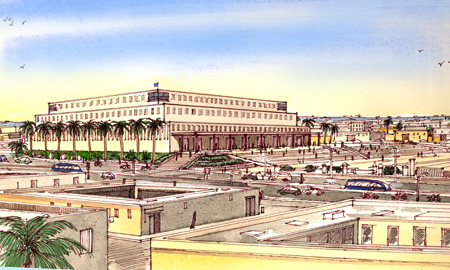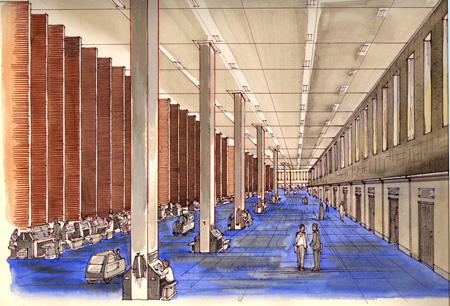Eridu, city of foreboding
Ersta 15, 230 A.C.
A report from Sutero Karakidis, recently returned from Eridu
Eridu, on the Eridanus River, was the first great city of Noantri New Earth. It was founded in the first decades after the Crossing by a community of technocrats and scholars from the last Noantri groups in the Old Worlds. It was the site of one of the Gateway termini, and in fact the Gate's terminal dome was located where the Great Library now stands. This is where all the records and libraries preserved from the Old Worlds were united, and the Library is still the central building of the city, its ultimate reason for existence.
I've just returned from a visit to Eridu, which dates back to the time of the Crossing. That was more than two hundred years ago. It would be a minor span of time for our ancestors in the Old Worlds, with our hundred thousand years of civilization and memory. Here in the New World, two hundred years seems like an eon. The Library was collected and built by people who had been born on the other side of the Galaxy. The memories of the people who keep it now are longer than our time on New Earth.
Redon the Fourth, the legendary Theophore (nouergist) who founded the Library and the City, is still haunting this place. You see his portrait everywhere, and you can buy Redon the Fourth memorabilia such as medallions, text collections, semiotika, and even little replicas of the black stone statue of him that stands in the center of the Great Library's courtyard. The vendors are active, but they also made me feel as though the best of Eridu was already in the past. And I suppose it is.
I'm used to cities with high-rise buildings and shiny commercial centers, such as our own Surakosai. Eridu, due to its government's ideology, never got around to building things like these. Eridu, on a flat river plain, is a sprawling city of low, brown or white concrete and block buildings, most of them no more than three stories high. The rule is that you can't build anything higher than the Library, which is on the only higher ground in the city. It's not that much higher, and yet you can see the vast white square setback of the Library from most vantage points in the city. There's a bit more color in the residential districts; at one point the city planners encouraged the residents to paint their shutters and doors blue, and you can still see some of these weathered features.

The Great Library and its plaza
Eridu used to be a first-rate city, before the revolutions of the 180s brought hard-line ideologues into power. These ideologues were a loose coalition of womens' groups, communalists, environmentalists, and university professors. They were true to the Eridanian ideal of having philosophers in charge of public life. After all, had not the Great Redon been both philosopher and king? From the late 180s onward, commercial investment drained out of Eridu, and the city changed into a home for cottage industries, craft centers, greenhouse and roof agriculture, and deliberately simplified technologies. The Library, isolated in its temple-like enclosure, remained as a resource for researchers, even after its duplicate, with the yet-undeciphered historical records, opened in Chrysopolis.
The war of 191 was devastating to Eridu, even if the invasion from the coast was repelled. For years you could drive for miles to the south and not see a single inhabited house or store or factory. In the last twenty years, they had finally been re-building and re-populating these places, usually under the protection of Aurian forces who quietly crossed the undefended border from the southeast. For years there's been talk that the Aurians would simply march through and occupy the outskirts of Eridu, or even the city itself. Eridu has no military, since it was dissolved by the philosopher rulers after its service in the war. Instead, a corps of psychologists and conflict resolution experts stands ready to face any invaders.
As a Surakosan, I wanted to see what had become of what was originally our "mother city." As a sociotexter, I had read countless texts out of Eridu describing Surakosai as corrupt and enslaved to commercialism. What was the alternative like? At the hostel where I stayed, instead of texts on entertainment or restaurant lists, I received directions to the Library and an application to do research there. There were texts everywhere; in Eridu, they assume that you can read. Instead of graffiti, the walls had inspirational texts such as EVOLUTION REQUIRES YOUR CONSENT and REALIZE YOUR POTENTIAL BY DEDICATED WORK. It sounds oppressive, but the people I met - even unchaperoned - didn't seem dissatisfied. In the week that I was there, I was invited to eat dinner at many private homes, where affinity groups served tasty and plentiful meals, usually Algon style with lots of grains and chunks of chicken or lamb in spicy sauce. No one offered me anything alcoholic, unfortunately. They told me it was difficult to get beer in the city.
What do they talk about in the city of philosophy? Right now, the Eridanians are nervous. There are rumors of a large Aurian military buildup to the East, just across the river and the border. Remote viewers have confirmed that there are large numbers of covered trucks parked at the border, lightly concealed in tall rushes and marsh platforms, as well as covered lifters and rotocraft. What are the Aurians doing? It seems too small to be a full-scale invasion force, but something is definitely going on. Why are they doing this now?
The licensed forecognitives and intuitionists agree that something bad is coming, but they can't decide what it is. Maybe it will be a flood or some other natural disaster. Their information is too vague to sound an alarm, but my hosts tell me that some people are leaving Eridu because they are afraid of what is coming. They themselves won't leave, they say, because they will be able to handle anything. They are more highly evolved in the way of resourcefulness and peaceful compromise. But one of my hostesses told me that her household is quietly stocking up on dry provisions and bottled water.
As I walked toward the Library on a misty evening, I felt a sense of foreboding, both in the atmosphere of the City and the shared mental substrate. There were very few people in the plaza, and the lights were subdued. Some of the older buildings were all dark; I had already experienced a number of power outages during my stay. I passed the monuments of previous rulers, including that of Apsou-Ari, the controversial nouergist architect who had ruled just before the revolutions. Her monument had been destroyed in the first revolution, and this modest tribute to her had been built decades later. It was much smaller than the original, and lacked decorative lighting. The souvenir and food vendors had packed up and gone home.
The Library, though, was still brilliantly lit. I was met by my assigned guide as I arrived at the central doorway of the Wall of Nine Gates. She made sure to point out to me the venerable framework of the Eridu Gateway, mounted on the interior wall over the central three gates. It was through nine Gateway locations on this planet that our people came to New Earth, and the Library commemorates this. The old framework was cleared of its radioactivity and placed in the temple of memory, so that we can all remember what brought us here and where we came from.

Interior of the Great Library of Eridu
The Library is no longer run by the government. It has been in the hands of a private corporation of Lords of Memory since the Revolutions. I met with a representative of that corporation, dressed in her snow-white Lord of Memory uniform. Her name was Andeldona of Clan Dona, and had been designated to speak to journalists this year. I doubted that I would get much of a true picture from a professional designate. Indeed, I didn't get to ask many questions. She was intent on telling me (and, by representation, the Surakosan readers) how independent and self-sufficient the Library had become. "The entire roof, except for a network of elevated walkways, is paved with photovoltaic cells so that our power is all solar-generated," she said proudly. "We never have power outages." They had thought of everything, as if the Library was already under siege. "We use rainwater purification and keep our own water supply in the crypts, down where scholars used to get lost." And she added, "And we have all taken lessons in conversational Aurian."
"So," said I, "you are taking the rumors of an Aurian invasion seriously?" She smiled in the knowing and, to me, somewhat condescending way of Lords of Memory. "Our Library has withstood lightning, earthquake, floods, and wars. We are still here. Anyone who can read and who remembers history is welcome here."
People are leaving Eridu. I saw them in buses, heading for the suburbs and points north, clutching what baggage they could carry. At first they wouldn't answer my questions. I saw mostly poorer people and craftsmen, not the ruling philosophers or people from the University. Despite their militant egalitarianism, the philosopher rulers have not been able to eliminate social and economic differences. Finally someone told me that he had heard that the Aurians would invade and enslave them. Another told me, furtively, that she had seen outbreaks of religion and wanted to escape before it spread throughout the city. By the time my week was up, I was glad to leave the once-great city, the city of foreboding.
They say that in times of danger, the "sending" of Redon the Fourth appears at the northeast corner of the upper rampart of the Great Library. A "sending" is a lifelike projection of a master Nouergist. Redon has been dead for almost two hundred years, but every so often someone claims to have seen his figure, glowing a bright cobalt blue, in the place where he used to watch dawn come up over his city. Before I left, after the lights were out for the night, I looked at that corner, hoping to catch a glimpse of blue light. But there was nothing on that cloudy night, not even stars.
Posted at 2:02 am | link
Archives:
October 2011 (1)
September 2011 (1)
September 2010 (1)
July 2010 (2)
June 2010 (1)
May 2010 (2)
April 2010 (14)
March 2010 (3)
June 2009 (1)
May 2009 (1)
April 2009 (3)
March 2009 (2)
February 2009 (4)
January 2009 (4)
August 2008 (1)
April 2008 (2)
March 2008 (2)
February 2008 (4)